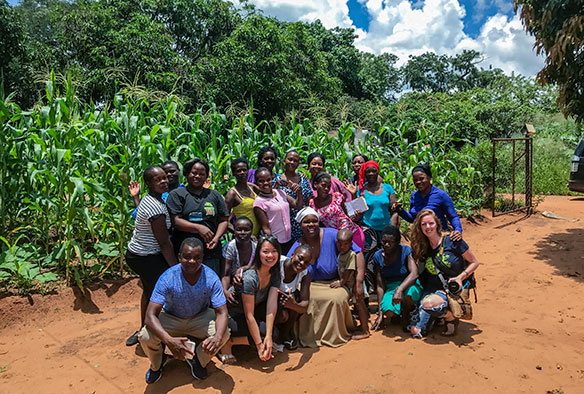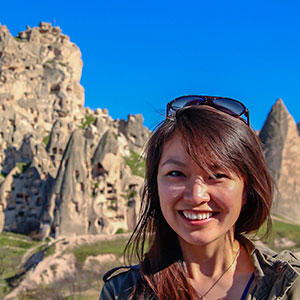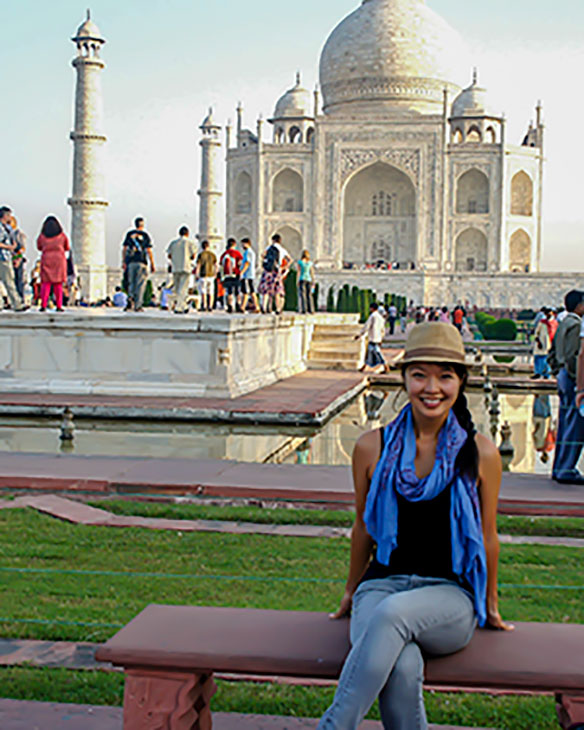
The ripple effect
ANN RUPPENSTEIN
(Photo above: Lee with the Lusumpuko Women’s Club in Zimbabwe. Planeterra partnered with the group to launch a cooking demonstration and meals for G Adventures’ travellers who visit Victoria Falls. The program benefits 20 women and their families, and sees 1,800 annual G Adventures’ travellers.)
They’re movers and shakers. Their contributions have changed and continue to change the nature of travel, both in Canada and around the world. In this week’s issue, Canadian Travel Press’ series of profiles on Women in Travel continues with Adrienne Lee, Director of Development at Planeterra Foundation, G Adventures’ non-profit partner.
Whether it’s defying traditional gender roles in India by empowering disadvantaged women to become professional airport transfer drivers or bringing travellers to remote countryside communities in Peru that otherwise wouldn’t benefit from the tourists who visit the likes of Machu Picchu, Adrienne Lee knows first-hand the positive impact tourism can have around the world.
But for the Director of Development at Planeterra Foundation, G Adventures’ non-profit organization, one of the highlights of the job is those moments when everything comes full circle. Take, for example, the Parwa Community Restaurant in Sacred Valley, Peru.
“The first year they were in operation they were able to build a computer lab for the youth in their community, so the youth didn’t have to travel two hours to access the Internet to do their homework. The second year they installed water tanks and started investing in a health clinic, they provide pensions and medical care for all the people working in the restaurant, and then this year, they came to us and said we want to donate a portion of our drink sales to Planeterra because you helped us start our own community project that has been so successful, we want to help another community do the same,” she tells Canadian Travel Press. “Just that whole circle effect of these programs and how communities are now investing in other communities around the world has been incredibly humbling and inspiring.”
While Planeterra was established in 2003 by Bruce Poon Tip as a means for G Adventures’ travellers to be able to give back to the destinations they visit, she says the foundation has changed significantly over the past 15 years.
“We used to be very much of a travel and build organization, helping to build schools, doing eye clinics around the world, but we really over the last eight years have recognized that the tourism industry, by stretching our market capital, we can have a way bigger impact in the destinations we visit by purchasing locally, by empowering people, by creating job opportunities,” she says.
Today, Planeterra, which has brought over 50 social enterprises to market in more than 30 countries to benefit nearly 53,000 people, focuses on building social enterprises for three main beneficiary categories: at-risk youths, indigenous communities and marginalized women.
“We believe that tourism has this great opportunity to create livelihoods and job opportunities for some of the most marginalized people in the world,” she says. “We often see that so many places we work are patriarchal communities, women are often the second gender in a lot of these communities, and we really work with women that haven’t had access to formal education growing up to be able to use homegrown skills, transferable skills, that can be converted into long-term job opportunities in the tourism industry.”
The road to Planeterra
Although Lee had a strong interest in community development, social enterprises and volunteer experience across the globe under her belt, she says she kind of happened upon working in the travel industry.
Prior to taking on a role with Planeterra, Lee could be found at an international non-profit in San Francisco that was focused on ending exploitation and protecting communities around the world from human trafficking and modern-day slavery.
“Then this job opportunity came up, and the job description was looking for someone who had done social enterprise work with women, working with communities around the world, and it was my home city, so it was time to move back,” she says. “Literally, me leaving San Francisco to me starting at G was 10 days – I like tucked and rolled into this job. I had done summer volunteer work overseas before, I had worked for the Korean Red Cross when I was living in South Korea, I worked in Kibera, which is one of the largest shanty towns in Africa, so community development has always been a strong interest and strong focus of my professional career, so to be able to utilize that in the tourism industry has been amazing.”
During her first five years on the job as a program manager, she worked directly with community partners to bring tourists to non-profit community associations and social enterprises, mainly in Asia and Africa.
“It might be a women’s group that does wonderful gender equality work that may never have hosted a tourism program as part of their greater programs. So really working with them to collaborate on ideas, bring their vision to life, provide them with the capacity training and any funding they need to get there; so in a lot of cases, we help find training restaurants, infrastructure improvements, if it’s a handicraft shop, it might be purchasing sewing machines,” she says. “It really depends on each individual partner’s needs, and then we work with G Adventures to bring it to market.”
Now in her current role as Director of Development at Planeterra, she says the focus is more on business development and working with other corporate supporters, donors, and individuals, and on advocating for their community partners.
“So, how can we make sure we’re expanding our programs more globally, getting the funding for it. G Adventures endows us with half a million every year and then 100% of donations we receive outside of G Adventures goes to our projects worldwide, so the greater breadth of donors that we have in our network, the more impact we can have on our communities,” she says.
Challenges and opportunities
As for someone she looks up to professionally, Lee points to Jacqueline Novogratz, the founder and CEO of Acumen, a non-profit organization that focuses on poverty eradication, and the author of The Blue Sweater: Bridging the Gap between Rich and Poor in an Interconnected World. When she was young, Novogratz had donated a sweater she outgrew to Goodwill, and wound up spotting it on a young boy in Rwanda more than a decade later, with her name still on the inside tag.
“Her story is incredibly powerful and her beliefs are very much invest in business, invest in people’s job opportunities, and when you invest in people’s livelihood, you’re investing in the local economy,” she says.
One of the biggest challenges in her line of work, which also presents an opportunity, is working on gender equality with many of the women’s groups Planeterra works with.
“That’s a big portion of the work that we do, to really start to change behaviour, change mindsets, and a lot of our community partners are leading that work to promote gender equality to men in their community,” she says. “The tourism industry too, once a lot of these communities see that women are an incredibly useful resource, they’re bringing home income, they’re becoming primary bread winners in these families, then the mindset totally changes.”
Looking ahead, she says the Planeterra Foundation is well into its “50 in 5 Campaign” – a five-year plan to integrate 50 new social enterprise projects supporting women, at-risk youth and indigenous communities, totalling $5 million into G Adventures itineraries by 2020.
“G Adventures has endowed us with $2.5 million of those dollars, and it’s me and my team’s journey to raise the other $2.5 million,” she says. “We’re hoping to bring these 50 enterprises to market – so a lot of work, but a lot of great work and the potential to have a lot of impact on a lot of community members around the world.”
Visit planeterra.org for more.
What’s your favourite destination to visit?
I really loved Bhutan. I took my mom there when she retired last year, and just the whole way they measure their economy based on Gross National Happiness is so unique, and how they invest in conservation, and how the rural government has purchased 90% of the land only to be used for conservation, I think is incredible. Conservation, and the health care work and the education work that they do. It’s a really cool country like nowhere else I’ve been.
What’s still on your bucket list?
So many places. I’d love to go to Rwanda and Uganda. I’ve never been, but I’ve been doing a lot of work remotely with a few women’s groups there. We’ve brought on a new person to steward our projects in Africa, and she just got back in December and she was raving about it, and it’s always been on my list so gotta get there one day.
Are you noticing any interesting trends or booking patterns?
Something that was really interesting to us was Sri Lanka. Every year, we sit down with the G Adventures product teams and we look at destinations that are going to have a high volume of travellers because those are really the destinations where we want to be building community projects for them to have customers; and a couple of years ago, Sri Lanka wasn’t even on our radar. We had a small passenger volume, and then out of nowhere, we started receiving 2,000 travellers; and it was our G Adventures product team who was like are we going to build a project in Sri Lanka? Now we have three projects there… the year-over-year growth has been astronomical.
What’s an important lesson you learned on the road?
Always be open-minded. Open mind, open heart. Working with several different cultures, there’s so much to learn, every culture is different; and I think as a visitor to a country the best thing you can do is be culturally sensitive, be open-minded, listen, observe, and let the local people guide you.



